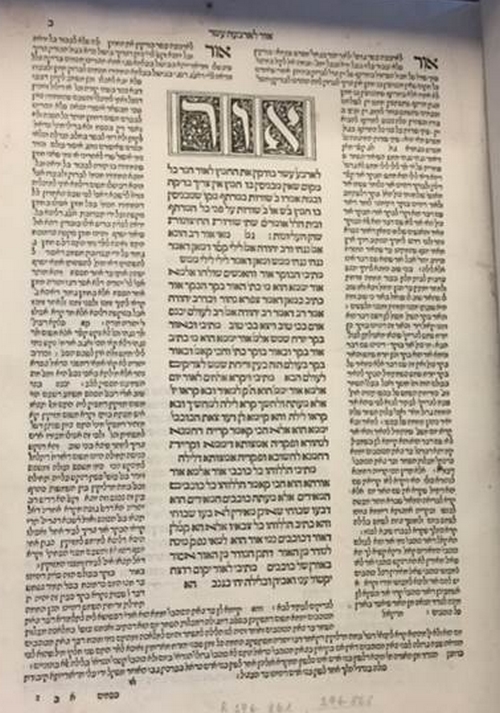
Written Compilations from the Land of Israel

More broadly, they seem to assert that no rabbinic compilation should be committed to writing. Similarly, the Bavli itself seems to have remained in oral form well into the Geonic period.
#Babylonian talmud professional#
In keeping with this, there is not a single talmudic reference to amoraim opening up a physical volume of Mishnah for consultation if a question arose regarding the proper text, a tanna – a professional rabbinic reciter – was consulted. No Talmudic Reference to Mishna as a Book!īabylonian rabbis asserted that the “Oral Torah” – which was basically equivalent to the rabbinic study of Torah – must remain oral, and they explicitly forbade its writing. Although we normally think of writing as the ideal form for organizing, transmitting, and preserving knowledge, Talmud scholarship has conclusively determined that the Mishnah was “published” orally and subsequently transmitted in oral form for many centuries.

This means that we need to sharpen our question: It is not so much “why did Babylonian rabbis not produce midrashic compilations” rather, “why did they not organize this material into complete, freestanding midrashic collections, as was the practice in the Land of Israel?” The Orality of “Oral Torah” in BabyloniaĪttention to the media of rabbinic text production and transmission may help us answer this problem. For example, the great fourth century sage, Abaye, is castigated: “מאי טעמא לא שכיחת באגדתא” – why are you unfamiliar with the aggada?” To heighten the problem: hundreds of aggadic statements attributed to Babylonian rabbis, and according to one estimate, something like a third of the material in the Bavli is aggadic, while only an approximate sixth of the Yerushalmi is aggadic. The absence of Babylonian midrashic works is especially surprising given the Babylonian rabbis’ interest in and devotion to midrash – there even was an expectation that they were to be generally proficient in midrash. Babylonian Rabbis Were Well Versed in Midrash But that does not explain why Babylonian amoraim did not produce a single midrashic work akin to the classical Palestinian amoraic midrashim, such as Bereishit and Vayikra Rabbah.

One part of it is easy to explain: the absence of Babylonian tannaitic compilations – say, a Babylonian Tosefta or Babylonian Halakhic Midrash, derives from the fact that Babylonian Jewry did not emerge as a center of rabbinic learning until the third century CE, namely after the end of the tannaitic period circa 200 C.E. It is surprising that only one rabbinic work, the Babylonian Talmud, was produced in late antique Babylonia, while numerous compilations, including the Mishnah and the Tosefta, several Midrashei Halakha as well as Midrashei Aggadah, were compiled in Roman Palestine. In late antiquity, rabbinic Jewry was divided into two centers: Galilee and Babylonia. In these times, let us all turn to our friends and family and strengthen the truly valuable bonds of our lives.Rabbinic Compilations in Late Antiquity: Palestine vs. We are in danger of losing our valuable possessions. In our current economy, many of us feel that the sun has suddenly set on us. However, even though I have already “broken” Shabbat by continuing to travel after the sun has set, I should minimize my violation by handing my valuable possessions to my non-Jewish friend for safekeeping until after Shabbat. Continuing to travel in this case was a matter of life or death, and therefore was permitted.

In the late antique Middle East, people generally traveled together in caravans for protection from bandits, wild animals, and other dangers on the road. The Mishnah suggests we look to a non-Jewish traveling companion in this case. In any case, the Mishnah understands that circumstances such as these may require a creative solution. We might be unexpectedly detained on our way. Sometimes we fail to plan for the future, even for something as regular as the Friday evening sunset. The Mishnah recognizes our flawed human nature. I do not have to give up my valuables just because I didn’t expect the sun to set on me. So, should I lay my burdens down and lose all the valuables I was carrying when Shabbat began? Is this some kind of “punishment” for not having planned my trip more carefully? The Mishnah’s answer is no. As far as the Talmud is concerned, carrying anything of value constitutes labor. If I am traveling on Friday afternoon and am unable to reach my home before Shabbat begins, what am I to do with my burdens? I am not allowed to carry in a public domain on Shabbat, as we have seen previously.


 0 kommentar(er)
0 kommentar(er)
